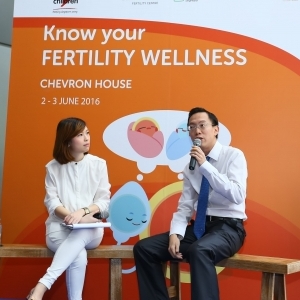The act of conceiving a baby is not as easy as it is often made out to be. Firstly, both genders have to be mindful of their ticking biological clock and secondly the prime age for conception is below the age of 30 years for women and about 35 years for men. In addition, cysts and fibroids in the womb can complicate conception further. Dr Jason Lim, Consultant Obstetrician from Singapore General Hospital at I Love Children’s “Know Your FERTILITY WELLNESS” spoke about “Cysts & Fibroids – What a Couple Needs to Know”, at a lunch time talk held at the Chevron House on 3 June 2016.

Contrary to popular belief, fibroids and cysts are not similar in nature.
Fibroids – The wall of the womb is made up of a very thick muscle layer and this is where fibroids grow. Fibroids are essentially the excessive growth of this muscular layer. Fibroids can grow in front, at the back, on top or on the sides of the womb and its growth can be very random. However, as malicious as they might sound, Dr Lim assured the audience that fibroids are benign 99% of the time.
Ovary cysts – As the name suggests, these are cysts which grow on the ovaries. It is crucial to understand that the ovaries are separate from the womb. The ovaries are where eggs for fertilisation are produced. Hence, having certain common types of cysts such as ovulation cysts should not hinder fertility. However, there are many different types of cysts ranging from the common types as mentioned to others of a more dangerous nature.
“Fibroids are benign 99% of the time. There are a wide variety of cysts – ranging from the common ovulation cysts to other more dangerous types. To know what you have and if it will hinder your chances of conception, seek advice from a fertility health doctor.” – Dr Jason Lim
Fibroids and cysts present different symptoms during a woman’s menstrual cycle.
Fibroids often start very small in size and do not present any immediate symptoms as they start growing. In fact, as Dr Lim states, most fibroids don’t give any symptoms at all and women only find out about them when they go for a health screening. However, when they do cause problems, fibroids affect the menstrual blood flow. Dr Lim says: “Some women, may have very sudden heavy menstrual flow or discover very thick pieces of blood clots in their flow. Others may find the length of their menstrual cycles becoming longer. If the woman experiencing these symptoms is planning or in the midst of trying to conceive, it is crucial for her to consult with an obstetrician.”
Cysts, on the other hand, do not interfere with the menstrual flow. Similar to fibroids, they start off small but without proper medical attention, they can grow to considerable sizes. The more apparent symptoms that women may experience with cysts are sudden bouts of lower abdominal pain which may or may not be related to the menstrual cycle. The pain might come and go in the initial stages and over time manifest into a more permanent type of pain. Another symptom is sudden and unusual painful cramps during menstrual cycles.
"Do not take chances when it comes to your fertility health. Not sure if the pain in your lower abdomen is a cyst or menstrual cramps? Visit a fertility health doctor today to find out."
If the fibroids are big or are in certain locations of the womb, they do affect the chances of successful conception. For example, if the fibroid is growing inside the cavity of the womb, that can cause problems with fertility either because its presence makes the environment in the womb very hostile for sperms to meet the egg during fertilisation or sometimes even if they do manage to get fertilised, the implantation of the embryo might be at risk.
However, there is no need to panic if you do have fibroids because not all fibroids need to be removed.
To determine if the fibroids need to be removed, we must first understand their behaviours and fibroids generally behave in either one of the two following ways:
- Fibroids can remain stable from when your doctor first discovers them without any change in size or symptom for many years. The condition of these types of fibroids can be monitored through regular ultrasound scans to observe its size.
- The fibroid keeps increasing in size and its symptoms worsens. The amount of blood loss in these cases can be quite considerable, even causing loss of consciousness. These are the fibroids that will require a closer look and treatment by your doctor.
Treatment options for this second type of fibroids, can be classified into two groups:
- The first option is where both hormonal and non-hormonal medications are used to control the menstrual blood flow that a woman experiences such that not too much blood is lost. However, do keep in mind that many of these medications do not treat the problem of the fibroid but aids in alleviating the symptoms.
- The second option of treatment is to perform surgery to remove the fibroid. This can be performed in various ways. Depending on the sizes and numbers of the fibroid as well as its location, surgery may have an impact on future fertility and/or subsequent pregnancy and delivery outcomes. Your fertility health doctor will be able to advise you appropriately based on the clinical findings of your fibroid(s).
There is no hard and fast rule on how to handle a fibroid and fertility doctors usually tailor a treatment programme to fit the patient’s demographics as well as a couple’s short- and long-term plans.
On the other hand, the types of cysts that do cause problems with fertility are generally more dangerous in nature.
An example of these type of cysts are blood cysts. Blood cysts are formed from menstrual blood and tissue. It is a regurgitation of the menstrual blood and tissue that does not get flushed out of the system successfully and instead gets refluxed back up into the fallopian tube and deposited onto the ovaries. This reflux action of menstrual blood, over time, forms blood cysts.
There have been studies to suggest that blood cysts can affect fertility in the long term so it is important to go for regular fertility health checks to see if the blood cysts hinder the chances of conception.
“Whether it is fibroids or cysts that you are concerned, making an appointment with a fertility doctor to determine your fertility health and potentially spotting any obstacles to conception is key to a successful pregnancy.”
Do fibroids cause miscarriages?
This is dependent on the size and location of the fibroid. However, in many cases, the miscarriage is not due to the fibroid itself. This is particularly applicable if the pregnancy was successful in completing the first trimester.
What if the cyst/fibroid is discovered during a pregnancy and grows in size? Will I have to remove the cyst/fibroid? Will either one affect the baby’s development?
We usually leave fibroids which grow bigger during pregnancies alone. This is because, fibroids are very responsive to female hormones. So during pregnancies, fibroids become very rich in blood flow and can cause serious complications if removed.
Fibroids can affect pregnancies in some sense as it may cause the position of a baby to change. If fibroids are discovered in an expectant woman, more regular scans are conducted.
This same advice applies to cysts discovered during pregnancies. If the cyst does not grow any bigger and cause any pain or problems, it is usually best to leave the it alone. In some cases, the cysts will may get smaller or disappear with the delivery of the baby.
Is the surgery to remove fibroids minor?
The surgery can be minor or major depending on the location of the fibroids. It can get harder to access certain locations of the womb during surgery to remove the fibroids. This gives rise to certain complications that will occur during surgery. On the other hand, there are fibroids that are easily removed.
As a general rule of thumb, there is no need to remove fibroids if: i) they are of the same size year after year, ii) the menstrual cycles are normal and, iii) there are no symptoms.
This is because fibroids are very responsive to female hormones in the body so in some cases, especially for women who are nearing menopause, the best suggestion is to leave these fibroids alone.
Is it normal to experience acute pain around the keyhole surgery to remove a cyst once in a while?
Yes, it is common to feel some discomfort pain and numbness when you have had any surgeries performed around the stomach region. This applies to women who had caesareans, who after a few years still attest to experiencing discomfort. That said, it will eventually recover but will require time.
Are there any foods that should be avoided to decrease the chances of getting fibroids?
There is no one particular food you should avoid or consume which will increase or decrease the growth of fibroids. There is a school of thought instead, that some fibroids may be hereditary.
I Love Children thanks Dr Jason Lim Shau Khng for his valuable input.
View this event's video highlights or photo gallery.




